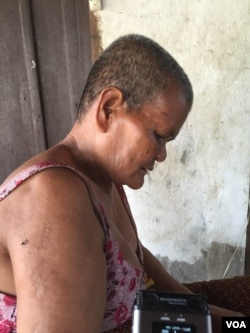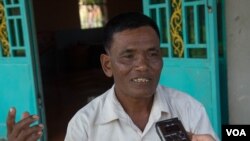Little is known about Oeuth Ang, the man accused of killing Cambodia’s popular political commentator Kem Ley.
What is known about the 44-year-old former soldier, troublesome Buddhist monk and indebted gambler, raises more questions than answers.
Taken as fact provided by police and witnesses is that on Sunday morning, July 10, he walked into a Caltex gas station convenience store in Phnom Penh and, for no apparent reason, fired on Kem Ley twice—including an execution shot to the head.
Later, Oeuth Ang would give police a false name: Chuop Samlap, which means, in Khmer, "meet to kill."
True to his false name, Oeuth Ang, as witnesses tell it, had literally just met and killed Kem Ley.
Little makes sense about Oeuth Ang’s actions.
After the killing, he made little real attempt to escape, walking almost causally away from the scene.
Still carrying his weapon—an expensive Glock pistol—the indebted, poor ex-soldier intermittently brandished the gun at a small group that followed him as he walked for more than 30 minutes along several of the city’s busiest streets.
Oeuth Ang did not seem to fear arrest. Or, much like his self-incriminating false name, perhaps he wanted to be caught.
He would later say his motive for the shooting, to which he confessed, was a debt of $3,000 that Kem Ley had failed to repay.
Relatives and friends of Oeuth Ang in Siem Reap province say he didn’t have any money to lend. He was a gambler, who had just sold his own motorcycle to pay off a debt. Shortly after, he left for Phnom Penh, giving a vague story about visiting a relative.
Many Cambodians believe Kem Ley was killed for his commentary on a report by Global Witness that Prime Minister Hun Sen’s children and extended family had amassed hundreds of millions in personal wealth.
In a country where critics of Hun Sen’s government regularly fall to assassin’s bullets, many are suggesting state involvement in the killing—a notion that could deepen resentment among a new, younger generation toward decades of harsh rule by the Cambodian People’s Party.
‘I am now a soldier’
Hundreds of kilometers from Phnom Penh, in Siem Reap province’s Norkor Pheas commune, those who know Oeuth Ang said they can barely believe he could have carried out the killing. Even less plausible: the idea he had $3,000 to lend anyone—least of all a political analyst in the capital.
Relatives and friends told VOA Khmer it was doubtful that Oeuth Ang even knew Kem Ley.
Um Oeung, a friend of 30 years, said Oeuth Ang disappeared from the village about two weeks before he saw his face on television as the commentator's accused killer.
Crucially, five days before the killing, Oeuth Ang called Um Oeung unexpectedly to tell his longtime friend that he had found a new job—as a soldier.
“He disappeared for about half a month," the alleged killer's friend recalled. "I called and could not reach him. About five days before it happened he called and asked me, ‘Brother, where are you?’ I asked him, ‘Where are you?' He said he was busy studying and he didn’t have his phone on. I asked him what are you doing, and he said, ‘I am now a soldier.’”
“I asked him, ‘where do you work as a soldier?’ He said, in Phnom Penh, earning $300 a month.”
Um Oeung remembers the phone call then ended abruptly.The next time Um Oeung saw his friend, it was on television.
“I was very shocked. I could not eat,” he said, recounting his friend as a former monk who was generous, giving when he could to more needy people.
“When he had 10,000 or 20,000 riel ($2.50 or $5) he gave the money to older people to buy food for their kids,” he said.
Hoeum Huot met Oeuth Ang earlier this year and they married in May.
The 45 year old said she doesn’t know a great deal about her husband of just two months other than he had previously fought for the Khmer Rouge, had worked in Thailand, had been a monk in Siem Reap and, most recently, was involved in protecting the environment.
“I am his wife but I do not know much,” she told VOA.
Hoeum Huot remembers that two weeks before Kem Ley was killed, her husband said he was going to Phnom Penh to meet a relative.
Before he left, they had fought over his gambling. He had lost money and was forced to sell his motorcycle to repay the debt, she said.
“He said he was going to meet his relative in Phnom Penh," she said. "Then he left without saying much.”
Hoeum Huot said her husband didn’t identify the relative, or why he was going to meet him.
One thing, however, is sure. Oeuth Ang didn’t have any money.
“He spent my money," she said. "He did not have any money."
Bullets beneath pagoda stones
The abbot of Thnung Pagoda, Soeum Suon, told VOA Khmer that Oeuth Ang first came to reside with his religious community in 2012. He banished him from the compound a year later.
Soeum Suon said he was aware that Oeuth Ang had been a soldier, so he asked if he had given up his old ways. Oeuth Ang said that he had.
His behavior over the coming months would betray that promise.
Oeuth Ang, the abbot said, didn’t listen to the advice of the more experienced monks and broke rules of residence, coming and going from the pagoda whenever he pleased, without permission and without giving a reason.
Secretive about his background—family members never came to visit Oeuth Ang—he also acted aloof and arrogant with other monks, Soeum Suon said.
“I kicked him out of the pagoda because he did not follow Buddhism principles,” he said.
Maybe if he had spent more time studying Buddhism during his year at the pagoda he would not have been “blinded and led to killing,” Soeum Suon added.
Soum Samron, who was responsible for monks in the district, said Oeuth Ang, after being ejected from Thnung Pagoda, went to Kombor Pagoda in Varin district, Svay Sar commune. He then left Kombor and went to Pong Tanon shrine in Kok Doung commune, Angkor Chum district, Soum Samron said.
Oeuth Ang, he remembers, was a man in robes, but with little else that marked him as religious.
At Pong Tanon, he was accused of hiding bullets beneath a rock inside the compound and having an affair with a woman. The committee in charge of the shrine tried to defrock Oeuth Ang, but he resisted.
“He did not agree until a girl came out and confessed that they were together. After that he disappeared,” Soum Samron said.
Oeuth Ang scared many, he added.
“He once said: ‘If I were a layman, I would get a gun and kill everyone in this village and not spare even one. And the monks, if they did not listen to me, I would kill them too,’” Soum said.
A mean drunk
Oeuth Ang could be mean when he was drunk, said Ek Eam, his uncle and chief of Tonle Sar village.
He says his nephew. the longtime soldier, had gone to work with his first wife in Thailand. It was when she left him for another man that Oeuth Ang returned to Cambodia to join the monkhood, and his personality seemed different than before.
“When he is drunk he uses mean words,” Ek Eam told VOA Khmer, adding that he never saw his nephew become violent.
“He came here [only] once in a while, so he wouldn’t do anything bad, but when he went somewhere else, I am not sure," he said. "When I heard about the [killing], I was shocked. All of his relatives were shocked.”
Oeuth Ang’s mother, Ek Tap, said she doesn’t believe the official motive cited in her son's murder investigation.
There must be others involved, the 64-year-old said, appealing for someone—either in government or an outside organization—to uncover the truth.
“I think there was someone behind my child’s back,” she said.






